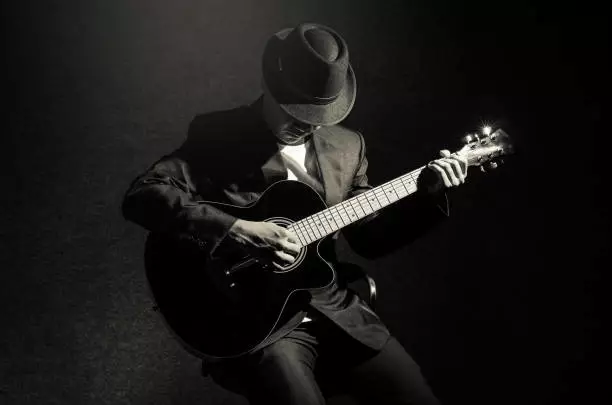A glaring example is associated with jazz diva Billy Holiday, who became the target of Federal Bureau of Investigation chief Harry J. Enslinger. He seeked an official ban on all her public appearances at cabaret shows across the United States because of the "bad morals" she allegedly spread as a former convict in public.

Namely, the famous Lady Day due to drug problems will be the subject of observation by the FBI Narcotics Department, for which the investigation against her later turned into a personal fight against her by the declared racist Harry J. Enslinger, who ruined her life. He did not hide his views on black music performers, often talking about how blacks people cross all boundaries in American society, and that black jazz musicians who enjoy marijuana have created devilish music. However, blues and later jazz later caused the greatest cultural shock since the Great Depression, far more than the Beat movement and the sexual revolution of the late 1960s did, as many today believe. Blues and jazz music was becoming commonplace with millions of Americans waking up and falling asleep, more on radio and less on television in American homes. The record labels sprouted like mushrooms fighting for the signature of black musicians who were increasingly establishing themselves on the music scene despite the racial divisions within the American society.
What is worth mentioning is that unlike jazz, where after the entry of white musicians in some way became music for the more sophisticated circles, ie. for the upper middle class gentlemen, while in the blues sought refuge the majority of the working class who not have such a refined taste for art, but who deep down in their souls seeked solace after a hard day's work in the conditions of cruel capitalism that thousands of migrants from Europe defined it as the American dream. It is indisputable that the blues became consolation for thousands of factory workers, or at least a magical drink that intoxicates the soul, while the tired body is immersed in bourbon. The great jazz pianist Duke Ellington would often say that if the blues were wine, he would be drunk every day.

Blues as a word originates from the English word blue which, in addition to blue, also means a kind of sadness. English lexicographers discovered that the phrase "to look blue" dates back to 1550 and means "to suffer or be in a bad mood." The English use of the term "blue devils" for evil demons goes back to 1616. The figurative use of the word blue as a metaphor for bad mood leads us back to the year 1787, but the plural form of that word (blues) describes the meaning of delirium. If we look at the use of that word on American soil in the early 19th century, we will see that in most examples it was synonymous with sadness, from which the misconception is literally accepted, that the blues is an expression of a sad and melancholy mood. However, after the Great Depression, and especially after World War II, folklore from cotton and corn plantations slowly moved to large urban areas that became centers of blues and jazz, and later rock and roll. With that, the blues was slowly but surely developing into an urban metropolitan blues that was becoming a kind of blues art (such as jazz) which later evolved into rhythm and blues, becoming the basis for the development of a new music genre, rock and roll or rock music. Thus, in the urban blues, became a synthesis between country and delta blues on the one hand and electric blues on the other, we less and less detect that diverse lyrical content that sings of hard physical work, poverty, difficult economic situation, the transition from slavery to freedom and even racism and segregation. The lyrics became simpler and more concerned with love and sexual worries, the relationship between a man and a woman, an unhappy marriage, but also alcoholism and drugs in the family. All these troubles and troubles of the people of the big cities, who in the twilight of the American dream that is born as a result of prosperity, take on new forms of vices as an integral part of consumerism and mass consumption. In all that brilliance of advertising colors where blue dominates the most, the so-called prison blues was born.
A transition of a culture that slowly moved from an agrarian and rural setting to an urban environment, far more developed in every way, where the opportunities for creative expression are far greater, primarily due to the large audience, repertoire and demand.
There was a growing need on the music scene for a philharmonic performance of music such as jazz, in the style of orchestrated classical music. Most blues and jazz musicians attracted by the new possibilities travel far north of the Mississippi Delta to centers like Detroit and Chicago, carrying their tin orchestras or remnants of the reggaeton, or forming new blues and jazz ensembles. Some of them went to the far west, the land of all possibilities. Thus, chords from the dusty Beale Street in Memphis and Bourbon Street in New Orleans in the early '60s moved to 20 Grand Lounge and Grande Ballroom in Detroit, or Kingston Mines and Lee's Unleaded Blues in Chicago, the city where the famous Robert Johnson will say it is a sweet home for the blues. Yet no matter how much "passivation" there is in the socially engaged life of the black community, whose members are increasingly taking their place on the cultural scene, there are still individuals on the US blues and jazz scene who dare to protest, through their own authenticity expression, to make their own critique of developments in American society. The famous blues musician J. B. Lenoir is one of them. He often sings about injustice, racism and soldiers in the Vietnam War, as an introduction to the wave of anti-war protests that will follow in the late 1960s. An expression of revolt that will not only be part of the cultural scene, both music and film, but also sports, politics and academia. A civil protest that penetrateddeep into all the pores of a racially divided American society. Lenoir's repertoire includes verses such as:
"Every black child born in Mississippi,

you know that poor child was born dead.“
or:
"I never will go back to Alabama,
that is not the place for me.
I never will go back to Alabama,
that is not the place for me.
You know they killed my sister and my brother,
and the whole world let them peoples go down there free.“
A musician who left a big mark on the American music scene with his politically engaging work, for which the popular British blues musician John Mayol will later revere his death in the song Death of J. B. Lenoir.
Lenoir was not alone in his protest songs, which in the '50s and especially in the' 60s of the last century, occupied a high place on the American music scene. On the contrary, more and more people appeared in the world of culture and art in the United States who contributed to the development of the music scene that became a corrective of American society. Politically engaged artists increasingly supported the distribution of daily and weekly newsletters, newspapers and magazines, aimed at promoting radical songs among the broad layers of the working class, primarily folk songs, but also blues and jazz. All of this was supported by the Works Progress Administration (WPA) project, which had the task at the federal level of promoting art in the working class to create a singing labour movement that raised workers' awareness through thousands of union refrains. Guided by the idea that, just as every church has its own choir, so every factory should have its own choir. But the US ruling elite did not think so, especially after World War II and the bloc division that resulted in a cold war between the capitalist West and the Socialist East. An overture to all this is the enactment of the U.S. Foreigners Registration Act of 1940, also known as the Smith Act, which further complicated the situation of economic migrants, who primarily belonged to the working class. McCarthyism further complicated the situation of the working class and its supporters in the United States. That political instrument, as the highest degree of repression, was not only an attempt by the American ruling class to limit the way the working American people can organize, but also to suppress any attempt to create a new culture that can be consumed. The music produced by Woody Guthrie and similar musicians at the time was a unifying force in the leftist circles of American society, where members of the Black Panthers, as well as members of the Revolutionary Communist Party, which included many Maoists, found refuge.
The Communist Party of the United States (CPUSA), which at the time had about 100,000 members, despite being more of a Social Democrat than a revolutionary, was a major factor in the mass unification of the American working class like no other party before and after in the short American history. Within the party there is a broad social democratic consensus between the factory workers and the various popular fronts united against the exploitation of the capitalist ruling class and repression by the US Government. A climate of radical working-class counterculture was being created within the party itself, through open propaganda about workers' rights and class divisions, but also the racial divisions that are becoming more pronounced at the time in the dominant American culture. Art, especially music and film, was increasingly trying to make the most of radio and television as a means by which left-wing artists can propagate and exchange ideas. In the heyday of the new cultural industry, they saw their opportunity to incorporate socialist ideas into the worldview of the average American citizen, worker, farmer,
peasant, thus changing the cultural landscape of a more revolutionary America. In addition to radio and television, writers, musicians, filmmakers, and artists on the left-wing political spectrum were increasingly using the services of record labels and film studios in their efforts to create a counterculture in American society. People like Woody Guthrie, Paul Robson, J. B. Lenoir, Heidi William Ledbetter (Led Belly), James Langston Hughes, Richard Wright, Josh White, Billy Holliday, Joan Baez, Peter Pete Sieger, Leonard Bernstein, Lee Hays, Burl Ives, Alan Lomax, Aaron Copland, the group Weavers, and many other politically engaged musicians and songwriters, as well as filmmakers of the calibre of Charlie Chaplin, Stanley Kubrick, Orson Welles, Dalton Trump, Arthur Miller, and also their academic and intellectual elite supporters, such as Albert Einstein, Bertolt Brecht, Waldo Miller Salt, Ernest Hemingway, John Steinbeck, and a host of other prominent figures from the worlds of science, literature, film, visual arts, and sports were at the forefront of anti-communist policy in the United States.
Many of them were subject to observation by the Federal Bureau of Investigation - FBI, as well as the Congressional Committee on Anti-American Activities. Some of them ended up in the political pamphlet Red Channels, whose authors John J. Kinnan, Francis J. McNamara, Phillips H. Lord, Theodore S. Kirkpatrick, Kenneth M. Baerley and Vincent Hartnett published it in 1950 to denigrate prominent American public figures who allegedly aided the Communists in influencing US radio and television. In 1947, Walter Steele, executive director of the far-right National Republic magazine, testified before the Committee on Anti-American Activities, where he read aloud a quote from Communist Party Secretary-General William Z. Foster, where he praised folk songs and ballads, their performers, their poetry, their theatrical performances, their artistic handicrafts, advocating the importance of art as a social weapon. To Walter Steele, this quote serves as a warning that the Communists are indoctrinating Americans in the arts, especially in folk music. Political propaganda that later was largely present in the rhetoric of the John Birch Society, an ultra-right group led by anti-communist ideas, radical extremists who, among other things, oppose the Civil Rights Act of July 2, 1964. (Civil Rights Act of 1964). The anti-Communist campaign was hit by the Communist Party of the United States newspaper Daily Worker, in whose premises the US Tax Administration (IRS) raided on charges of allegedly unpaid taxes by the newspaper. What a coincidence! Only a month after Nikita Khrushchev's historic speech on February 25, 1956, when at the Twentieth Congress of the CPSU, the party would get rid of Stalinism forever. Just two years later, Daily Worker due to financial problems was forced to finally stop publishing.

In the 1930s and 1940s, music was increasingly used as an expression of protest, whether it was folk, gospel, blues or jazz. Billy Holliday performed the timeless Strange Fruit at the Café Society in New York in 1939, which later was the subject of observation by the Federal Bureau of Investigation, whose anti-narcotics investigator Harry Ansling tried to ruin her life, which he unfortunately succeeded in doing. The verses come from the pen of a Russian-American Jew, Professor Abel Miropol, who witnessed the lynching of two black boys by a group of white racist people. A song that sends a powerful anti-racist message in the fight for civil rights in the United States. The death of Billy Holliday in 1959 did not diminish the socio-political engagement of progressive blues, jazz and rock musicians; on the contrary, they increasingly publicly expressed their political views against US colonialism, imperialism and military intervention, as well as after increased racial segregation in America. Doing all this in a protest way through his work. Among the most important music artists of the time is Peter "Pete" Sieger, who comes from an artistic family, whose father was a musicologist and whose mother was a respected violinist. As far back as 1955, in the era of Joseph McCarthy, Sieger was called to testify before the Congress Committee on Anti-American Activities about his political leanings, but he refused to testify about what he would be punished for disrespecting Congress. The blacklist compiled by McCarthy's team included thousands of names of American citizens, including celebrities from the worlds of culture, art and film, accused of anti-American activities. Sieger would later say: "I love my country very much and I categorically reject this implication, that some places where I have sung, some of the people I have known, some of my opinions, whether religious or philosophical, or maybe I am a vegetarian, all this to me makes him less American. "
Click here to read the 1st part of this article.






